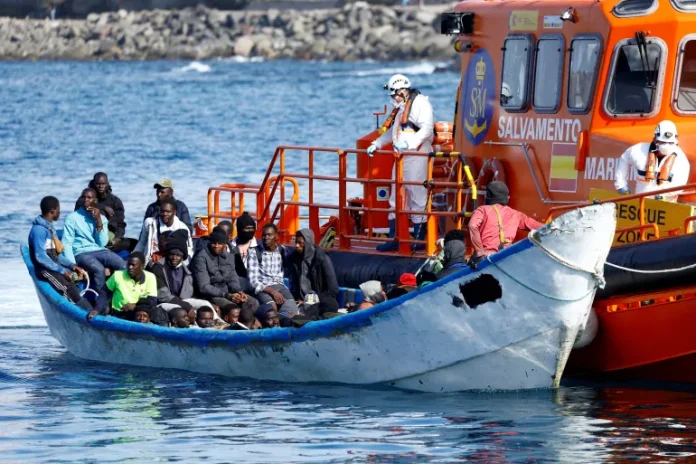The Canary Islands have broken the record for the second year in a row for the number of immigrant arrivals in 2024, according to figures provided by the Interior Ministry on Thursday.
The archipelago welcomed 46,843 people in 2024, up 17.4 per cent from 39,910 in 2023. Arrivals in Spain totalled 63,970, up 12.5 per cent from 56,852 in 2023. This figure is almost equal to the 2018 high of 64,298 people. The Canary Islands therefore accounted for just over 76 per cent of total arrivals.
In contrast, the number of migrants arriving via the mainland and the Balearic Islands fell by 6.5 per cent to 14,431. The number of people arriving by land via Ceuta and Melilla rose by 114.5 per cent to 2,647. The flow of people in the western Atlantic has put the migration debate at the centre of political strife. Especially around the 5,812 unaccompanied migrant minors in the archipelago’s custody.
Since the beginning of 2023, unlike earlier in the decade at the height of the pandemic, Pedro Sánchez’s government has accelerated the transfer of adults to different parts of Spain to avoid crowding in the archipelago. Custody of minors, however, remains with the autonomous government, which has so far been unable to reach a political agreement in Congress that would allow a reform of the aliens law and establish a system of compulsory distribution of minors among the autonomous communities. The Canarian government has doubled its network of resources to 86, according to official figures.
The Partido Popular (PP) is part of the government of the islands along with the Canary Coalition. On Monday, Canary Islands President Fernando Clavijo, in an interview with SER TV, lashed out at the government and the PP, accusing them of being “complicit” in maintaining the worrying situation in the Canaries. The Spanish leader said:
“The government, because it doesn’t intervene when it has the authority; and PP, because it blocks.”
This Thursday, Minister of Territorial Policy and Democratic Memory and former Canary Islands president Angel Victor Torres accused Clavijo of unfairly attacking the government in negotiations over the distribution of migrant minors because he wants to protect and not anger his partner in the regional executive, PP. He said:
“Clavijo governs with them. And in order to take care of them, not to anger and protect them, he is doing an injustice by attacking those who support him, that is the Spanish government. I think he is wrong, I say so.”
The PP national leadership has put Vox in the same bag as the central government to justify their stance on migration, where they remain true to their refusal to reform the foreigners law. PP national spokesperson Borja Semper said in statements to the media in Madrid:
“There are two irresponsible discourses. On the one hand is Pedro Sánchez, who says that immigration has no influence and must be dealt with as he sees fit; on the other hand is the irresponsibility of Vox, which says that the evil and origin of all the troubles that have hit Spain are linked to immigration. Sanchez and Vox share a common irresponsibility for the lack of a migration policy.”
The migration struggle has been at the centre of the debate for months. On July 23, the PP, along with Vox, voted against the consideration in the Congress of Deputies of a proposal drafted by the central government and the regional government – and supported in the regional chamber by PP itself. Since then, it has repeatedly left the negotiating table and blocked the conclusion of any agreements.
The most recent time was during the Conference of Presidents held in Santander earlier this month. The PP, threatened by Vox with any concession, has not moved an inch and has made its support conditional on the government fulfilling its demands on migration policy – the maximum demands that the executive has no intention of fulfilling.
